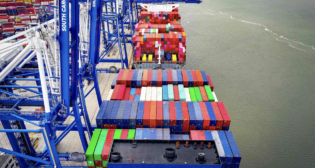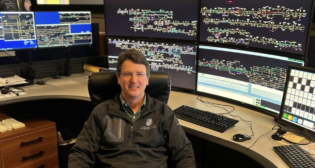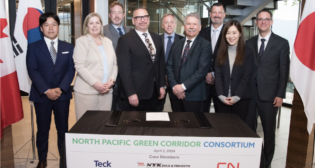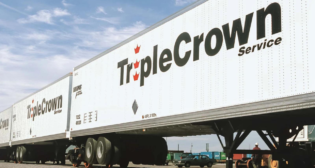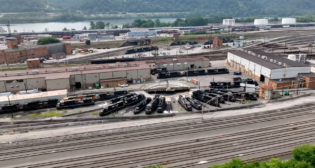
Cowen at NEARS: Key Takeaways
Written by William C. Vantuono, Editor-in-ChiefCowen and Company Managing Director and Railway Age Wall Street Contributing Editor Jason Seidl attended and participated in the North East Association of Rail Shippers (NEARS) Fall 2021 Conference in Portland, Me., in which participants discussed the challenging current environment for shippers. Cowen’s concurrent shipper survey “suggests strong business growth outlook, supply chain tightness through 2022, and neutral to positive support of the Canadian Pacific-Kansas City Southern merger.”
Following are key takeaways:
“Union Pacific Executive Vice President Marketing and Sales Kenny Rocker highlighted the very strong demand backdrop that should continue through the rest of the year, driven by a strong U.S. grain harvest and outperformance from coal. UP experienced some challenges due to the wildfires on the West Coast (the company highlighted the financial implications, which are expected to exceed $100 million this year), but was able to repair its tracks 30 days ahead of schedule. By 2030, UNP plans to reduce its carbon footprint by 26% as investments in clean energy and efficiencies will continue to be an emphasis for the company.”
“Surface Transportation Board (STB) Member Robert Primus highlighted the STB’s goal to enhance the network, focusing on service, which is ‘an area of concern.’ Primus highlighted that railroads emphasize buybacks, dividends and operating ratio improvement, all at the expense of service concerns. He believes PSR is a contribution to this, and while it has good intentions, the implementation has come at a cost to service; shippers are receiving the short end of the stick. Over the past five years, there has been a 20% reduction in labor among the Class I’s, and this is having a clear effect on reliability. We believe the STB will move forward with regulation for the rails (including reciprocal switching) that will work to improve quality of service for shippers. In terms of the CP/KCS merger, Primus stated that it is not a rubber stamp, and the STB will perform due diligence and see where the chips fall. That being said, we see it unlikely that the STB blocks the transaction.
“NEARs survey participants were neutral to positive on whether they were in support of the CP/KCS transaction, with 45% answering “Yes,” 32% “Maybe,” and 23% “No.” When polled how they feel about CN’s recent announcement of a new lower OR target to be achieved with cost cuts and ‘pricing well ahead of rail inflation,’ 61% of participants had a negative view toward its recent announcements of 2022 goals, while only 3% had a positive view, and 36% had no opinion. This was not surprising, given that we found there to be a lot of negative talk toward a railroad’s focus on OR at the conference from attendees and presenters alike.”
“When asked about their individual business outlook, 81% of participants had a favorable outlook towards their own business, a compelling majority that encourages us on the continued strength of consumer demand; 19% had a neutral outlook, while no participants had a negative outlook. In terms of how long they expect the current tight supply chain to continue, 50% answered that they expect supply chain tightness to continue through all of next year. This was in line with commentary we heard at our Cowen Transportation conference, where management teams highlighted tightness to continue through 2022. Some 27% answered that they expect tightness into 2Q2022, year, and 13% expect tightness into 3Q2022.”
“When asked if they expect the recently proposed federal mandates for vaccine testing in the workforce to have a negative impact on their business, 55% of participants said they believe that the mandates will have a negative impact, 29% answered that it will not have an impact, and 16% answered that it might have a negative impact. Building off this, 79% of participants cited a combination of three factors: difficulty getting workers, difficulty procure capacity from carriers, and increased testing costs.”
“CSX CFO Kevin Boone highlighted the challenges of the intermodal market, with international containers sitting an average of 10 days, five times what they were pre-COVID. Many of the problems at the ports involve labor shortages. CSX is still facing challenges hiring and particularly retaining employees. Absent employees remain higher, and any given day, about 10% of its T&E employees are out. CSX is paying up to $12,000 extra per year for a conductor that shows up to work every day.”
“Corrie Banks from Cando Rail & Terminals shared thoughts on the rail supply chain optimization that is in need of more investment, particularly after how COVID reshaped how shippers and carriers think about the supply chain. Currently, shippers are spending too much time trying to figure out where their freight is, which slows down asset turns. Adding cloud-enabled sensors throughout the rail network is imperative to future supply chain expectations.”
“FTR Vice President Todd Tranausky discussed the current rail network. Excluding autos, retail inventories are in line with historical levels. Due to natural gas prices increasing, coal is poised to continue strong trends through the first half of 2022. Intermodal carloadings are in line with their five-year average; according to FTR, the congestion will continue at this ‘peak plateau,’ and seasonal lulls will be used to work through the congestion. Railcar deliveries should continue to improve, with 2023 being the peak growth year in North America, per FTR estimates.”
